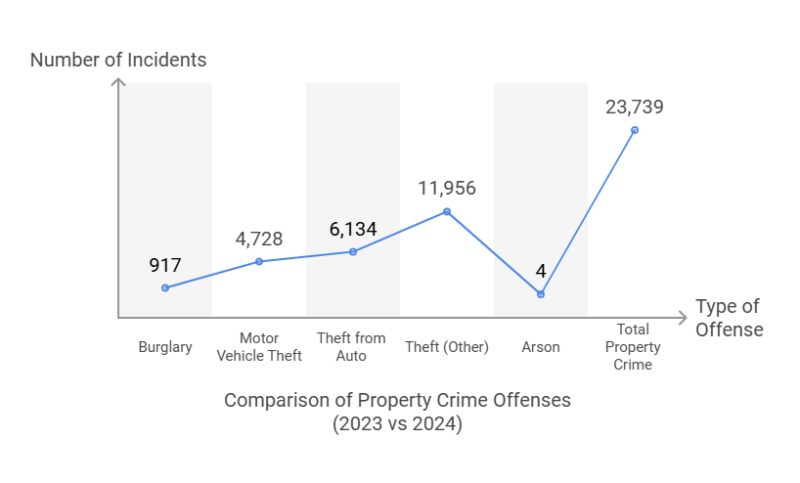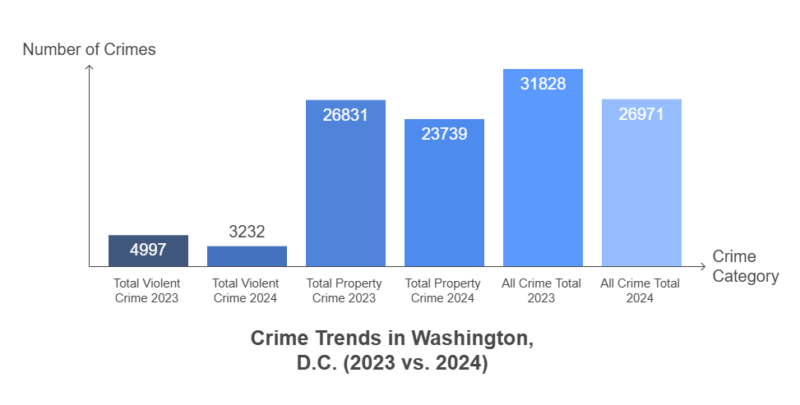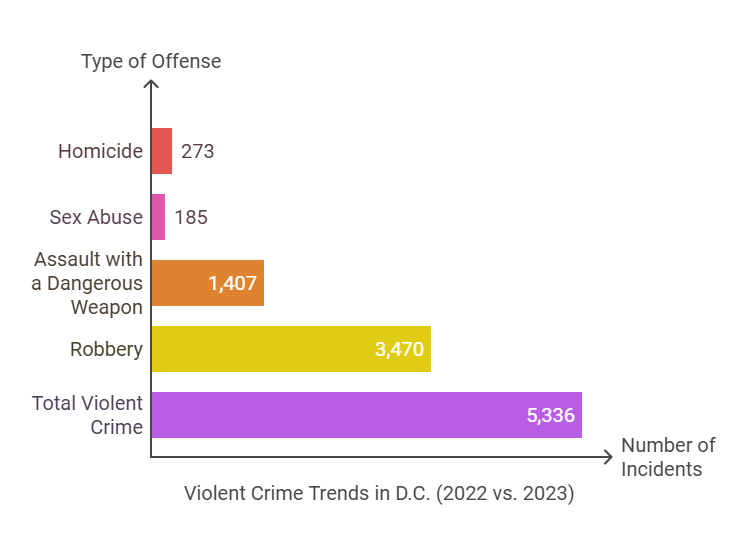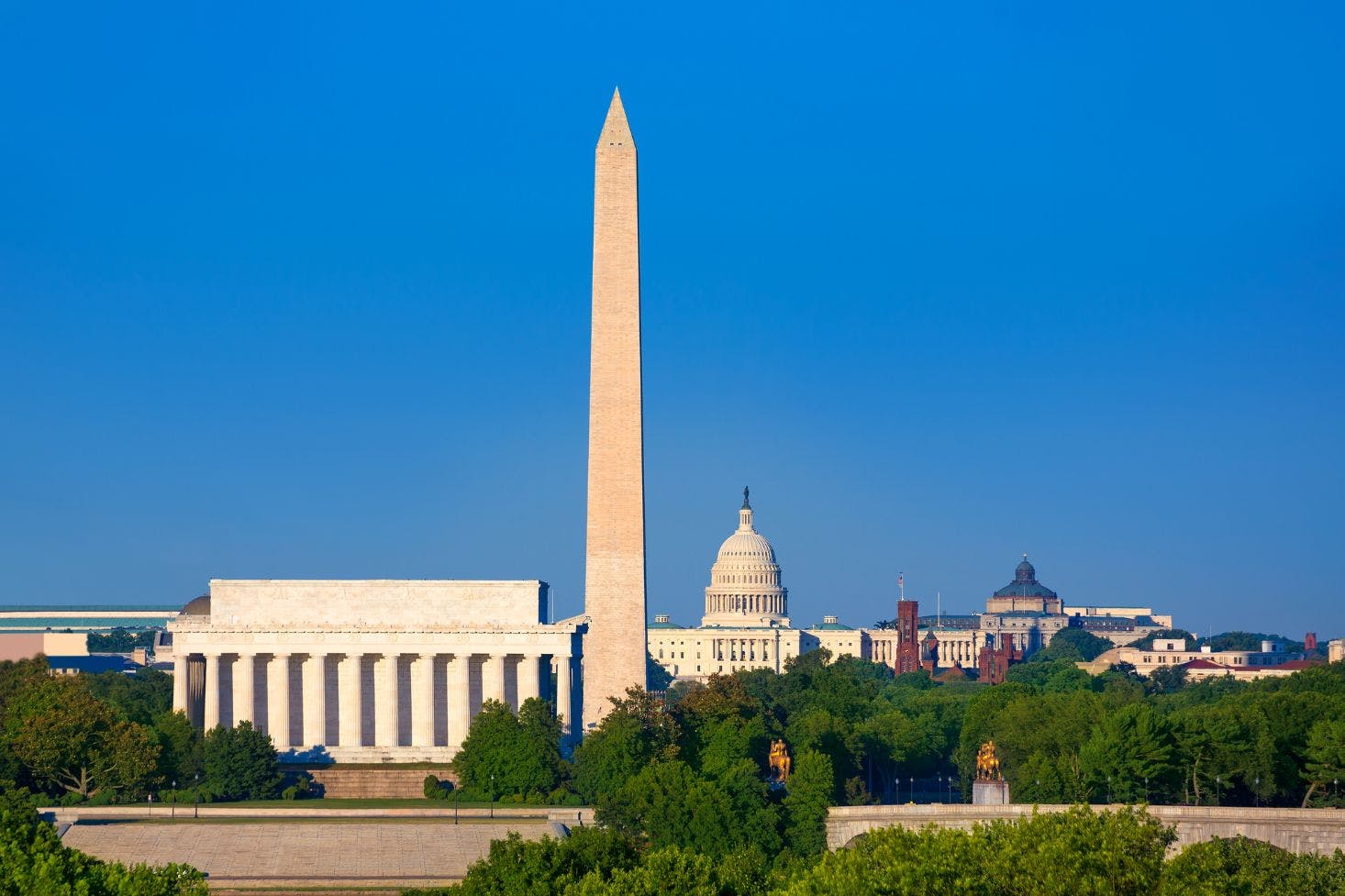Travelers do not have to worry about their safety while in Washington D.C., since it is a relatively safe place to travel to.
In recent years, Washington, D.C., has made significant strides in improving public safety.
Crime data from the Metropolitan Police Department (MPD) for 2024 reveals a mixed picture, with notable reductions in violent crime offset by ongoing concerns regarding property crime.
Violent Crime Statistics (2023 vs. 2024)
| Offense | 2023 | 2024 | Percent Change |
|---|---|---|---|
| Homicide | 252 | 178 | -29% |
| Sex Abuse | 170 | 141 | -17% |
| Assault with a Dangerous Weapon | 1,334 | 947 | -29% |
| Robbery | 3,241 | 1,966 | -39% |
| Total Violent Crime | 4,997 | 3,232 | -35% |
In 2024, Washington, D.C., experienced a significant reduction in violent crime, with the total number of violent offenses decreasing by 35% compared to 2023.
The most notable improvements were in robberies (-39%) and homicides (-29%), reflecting intensified law enforcement efforts and community engagement initiatives.
Reductions in sex abuse (-17%) and assaults with a dangerous weapon (-29%) further underscore progress in mitigating physical threats to safety.
These decreases are promising, indicating that violent crime is being effectively addressed across multiple categories.
Property Crime Statistics (2023 vs. 2024)

| Offense | 2023 | 2024 | Percent Change |
|---|---|---|---|
| Burglary | 1,007 | 917 | -9% |
| Motor Vehicle Theft | 6,377 | 4,728 | -26% |
| Theft from Auto | 7,184 | 6,134 | -15% |
| Theft (Other) | 12,254 | 11,956 | -2% |
| Arson | 9 | 4 | -56% |
| Total Property Crime | 26,831 | 23,739 | -12% |
Property crime in D.C. also showed a decline in 2024, with a 12% reduction compared to 2023.
Motor vehicle theft saw the most dramatic decrease (-26%), a testament to effective initiatives targeting car-related crimes, including vehicle recovery programs and enhanced surveillance.
The decline in theft from autos (-15%) and burglaries (-9%) highlights improved urban security measures. However, the slight drop in other thefts (-2%) suggests there is room for further improvement in deterring general theft offenses.
Notably, arson cases dropped by 56%, indicating a substantial reduction in intentional property damage incidents.
Overall Crime Trends (2023 vs. 2024)

| Category | 2023 | 2024 | Percent Change |
|---|---|---|---|
| Total Violent Crime | 4,997 | 3,232 | -35% |
| Total Property Crime | 26,831 | 23,739 | -12% |
| All Crime – Total | 31,828 | 26,971 | -15% |
Total crime in Washington, D.C., dropped by 15% in 2024, demonstrating comprehensive advancements in public safety.
The overall reduction in violent crime (-35%) played a significant role in lowering the total crime figure.
While property crime declined at a slower pace (-12%), it remains a larger contributor to overall offenses, emphasizing the need for continued focus on theft prevention strategies.
This balanced decline across both violent and property crimes reflects the success of integrated safety measures citywide.
Violent Crime Trends (2022 vs. 2023)

| Offense | 2022 | 2023 | Percent Change |
|---|---|---|---|
| Homicide | 203 | 274 | +35% |
| Sex Abuse | 184 | 185 | +1% |
| Assault with a Dangerous Weapon | 1,387 | 1,407 | +1% |
| Robbery | 2,076 | 3,470 | +67% |
| Total Violent Crime | 3,850 | 5,336 | +39% |
Between 2022 and 2023, violent crime in D.C. surged by 39%, with robberies (+67%) and homicides (+35%) leading the increase.
These alarming spikes underscored the urgent need for intervention, prompting a heightened response from law enforcement and community organizations in 2024.
The near-stagnant rates in sex abuse (+1%) and assaults with dangerous weapons (+1%) reflected the persistence of certain crimes despite broader challenges.
This upward trend served as a critical turning point for prioritizing violent crime reduction initiatives.
Property Crime Trends (2022 vs. 2023)
| Offense | 2022 | 2023 | Percent Change |
|---|---|---|---|
| Burglary | 1,054 | 1,092 | +4% |
| Motor Vehicle Theft | 3,756 | 6,829 | +82% |
| Theft from Auto | 7,827 | 7,797 | 0% |
| Theft (Other) | 10,814 | 13,349 | +23% |
| Arson | 4 | 11 | +175% |
| Total Property Crime | 23,455 | 29,078 | +24% |
Property crime surged by 24% between 2022 and 2023, with motor vehicle theft (+82%) and general theft (+23%) being significant contributors. T
he sharp increase in arson (+175%) was particularly concerning, though it involved relatively few cases. While theft from autos remained stable (0%), it continued to be a substantial contributor to property crime. This sharp rise highlighted vulnerabilities in property security that necessitated the introduction of stronger measures in 2024.
Safest Neighborhoods for Tourists in Washington, D.C.
| Neighborhood | Description | Safety Highlights |
|---|---|---|
| Georgetown | A historic district known for its cobblestone streets, upscale boutiques, and vibrant dining scene. | Low crime rates and a strong community presence make it one of the safest areas in D.C as per Travel Hotel Expert |
| Foggy Bottom | Home to George Washington University and the Kennedy Center, offering a mix of cultural attractions and proximity to the National Mall. | Considered one of the safest neighborhoods, with a blend of residential and commercial spaces as noted byBlueground |
| Dupont Circle | A lively area featuring embassies, art galleries, and a bustling nightlife, centered around a historic traffic circle. | WanderDC notes that relatively low crime rates, though standard urban precautions are advised, especially at night. |
| Capitol Hill | The political heart of the nation, housing the U.S. Capitol, Supreme Court, and Library of Congress. | High security presence due to government buildings contributes to overall safety. |
| Logan Circle | A residential neighborhood with Victorian-era architecture, trendy restaurants, and boutique shops. | Known for its safety and vibrant community atmosphere. |
Tips for Staying Safe as a Tourist
Secretary of Transportation Pete Buttigieg brilliantly proves that Washington D.C. is a safe city by mentioning that he walks his dogs.
“I can safely walk my dog to the Capitol today in a way that you couldn’t do when we all got here.”
Just hours after his comment, two people… pic.twitter.com/oLBsdKYeYp
— Collin Rugg (@CollinRugg) April 10, 2024
Follow these practical tips to ensure a safe and enjoyable visit to Washington, D.C.:
1. Plan Ahead
Research your itinerary in advance, including transportation routes and accommodations. Familiarize yourself with the safest areas to visit.
2. Be Street Smart
Stay alert, especially in crowded areas or places with limited visibility. Avoid distractions like looking at your phone while walking.
3. Use Trusted Transportation
Stick to reputable transportation options such as Metro, ride-share services (e.g., Uber, Lyft), or official taxis. If driving, park in secure, well-lit areas.
4. Leverage Technology
Use apps like Google Maps or safety-focused apps to navigate the city. Many apps also offer real-time crime updates.
5. Know Emergency Contacts
Save emergency numbers, including 911 for police and medical help, and know the location of the nearest embassy or consulate if you’re an international visitor.
Conclusion
Washington state has a combined crime rate of 3,763 per 100,000 people, which is the second highest in the country, has the highest property crime rate in the country. It also has the second-highest rate of burglaries, the third-worst rate of motor vehicle thefts, and the…
— Business Tactical (@Bacon_Is_King) December 17, 2024
Washington, D.C., in 2024 presents a safer environment for tourists than in recent years, reflecting a citywide commitment to public safety and community well-being.
Significant reductions in violent crime, particularly in homicides and robberies, signal the success of enhanced law enforcement strategies and community engagement programs.
Similarly, decreases in property crime, such as motor vehicle theft and burglary, underscore the effectiveness of targeted urban security measures.
While these advancements are encouraging, it is essential for visitors to remain vigilant, particularly regarding theft and in neighborhoods with higher crime rates.
By staying informed, planning ahead, and adhering to basic safety precautions, tourists can enjoy the rich cultural, historical, and political experiences Washington, D.C., has to offer without undue concern for their well-being.
